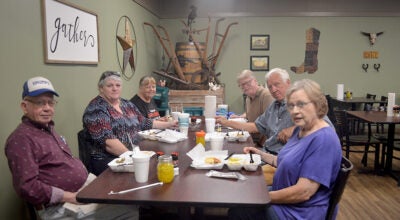Two surgeries, two chances at a new life
Published 3:00 am Tuesday, February 10, 2015
Twice, Michael Tillery has been on the list for a heart transplant. Twice, his number has been called.
Twice someone else died in order for him to have a better chance at life.
To say Tillery has been blessed would not be the appropriate choice of words. Thankful would be a better choice –thankful there are those who, in a time of grief, have compassion for others and are thankful that there are those who have the skill and knowledge to perform lifesaving organ transplants.
“Organ donors make a difference,” said Tillery, quality assurance senior specialist, Alabama Department of Labor. “They give others a second chance at life and a chance at a better life.”
At age 46, Tillery had that second chance at life, and now he takes nothing for granted. He finds joy in every day that God gives him.
Tillery said he is blessed to have this second chance with his wife, Cheri, and sons Alex, at the University of Alabama, and Houston at Pike Liberal Arts School.
“When I had my first heart transplant, I was nervous and scared because I had two young sons, and I didn’t want to leave them and my wife behind,” he said. “When I had the second transplant, I knew of more what to expect and was stronger in my faith. That made it easier to face.”
Tillery, a native Trojan, has battled heart disease since he was 23 years old.
“I have a family history of heart disease on my mother and grandmother’s side,” he said. “I was at Troy State when I had my first heart attack. I was flown to a hospital in Montgomery and had two stents put in. I had two more heart attacks and more stents.”
When Tillery was 25 years old, he was attending a conference in Savannah, Georgia and suffered another heart attack. His condition was such that he could not be transported back to Alabama. He had bypass surgery in Savannah.
“In 1995, I had a double bypass and a triple bypass in 2002,” he said. “After the triple bypass, I was told that I would need a heart transplant. I was sent to UAB to have a workup to see if I was eligible for a heart transplant and, fortunately, I was.”
Tillery’s condition was being treated with medication so he was rated a No. 2, which was on the low end of the heart transplant list.
“While I was waiting on a heart, I was put on a defibrillator and had a pacemaker put in,” he said. “That moved me up higher on the list.”
Tillery said he made several dry runs to UAB in hopes that he would get a new heart.
“Two or three people would be called because sometimes the heart wouldn’t be a match,” he said. “Sometimes I would be the backup in case things didn’t work out for the person who was supposed to get the heart.”
On Oct. 31, 2002, Tillery got a heart.
“The heart was that of a 16-year-old African American girl,” he said. “She had just gotten her driver’s license that day and was killed in a car accident.”
The young girl’s heart worked well for a while then blockages began to develop.
In the third anniversary year of Tillary’s heart transplant, he had 20 stents put in his heart and was again waiting for a heart transplant.
In March 2011, Tillery underwent surgery for a second heart transplant.
“This past March was the third year and, so far, no blockages have developed,” he said. “But there are no guarantees. There’s just no way to tell how the heart will continue to work. I take anti-rejection mediations. I take mediation for high blood pressure and cholesterol.
I’ve developed diabetes, and there are all kinds of risk factors including cancer because of the effects on your immune system. I wear sunscreen every day to prevent skin cancers.”
But, even with all the continued risks and demands, Tillery is thankful for second chances in life.
“And, these second chances are given because of organ donations and the advances in transplant surgery,” he said. “Amazing things are being done for sure. Life saving things.”
Tillery is a strong supporter of the American Heart Association that funds research into the prevention and treatment of heart disease.
The Pike County Chapter of the American Heart Association will host its annual Heart Walk from 5:30 until 7 p.m. tonight at the Troy Recreation Center. Admission is free and everyone is invited to come out and enjoy the fun and fellowship of being a part of a life-saving event.



